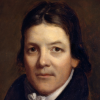ADRIANA: He is deformèd, crooked, old, and sere,
Ill-faced, worse-bodied, shapeless everywhere,
Vicious, ungentle, foolish, blunt, unkind,
Stigmatical in making, worse in mind.William Shakespeare (1564-1616) English dramatist and poet
Comedy of Errors, Act 4, sc. 2, l. 21ff (4.2.21-24) (1594)
(Source)
Quotations about:
insult
Note not all quotations have been tagged, so Search may find additional quotes on this topic.
SYPHAX: Young men soon give and soon forget affronts;
Old age is slow in both.Joseph Addison (1672-1719) English essayist, poet, statesman
Cato, Act 2, sc. 5, l. 136ff (1713)
(Source)
BENEDICK: What, my dear Lady Disdain! Are you yet living?
BEATRICE: Is it possible disdain should die while she hath such meet food to feed it as Signior Benedick? Courtesy itself must convert to disdain, if you come in her presence.
William Shakespeare (1564-1616) English dramatist and poet
Much Ado About Nothing, Act 1, sc. 1, l. 116ff (1.1.116-121) (1598)
(Source)
ALBANY: You are not worth the dust which the rude wind
Blows in your face.William Shakespeare (1564-1616) English dramatist and poet
King Lear, Act 4, sc. 2, l. 39ff (4.2.39-40) (1606)
(Source)
Speaking to Goderil.
It is a misfortune not to be loved at all, but an affront to be loved no longer.
[C’est un malheur de n’être point aimée ; mais c’est un affront de ne l’être plus.]
Charles-Lewis de Secondat, Baron de Montesquieu (1689-1755) French political philosopher
Persian Letters [Lettres Persanes], Letter 3, Zachi to Usbek (1721) [tr. Healy (1964)]
(Source)
Chiding Usbek for leaving her and his other wives behind as he travels to France.
(Source (French)). Alternate translations:
'Tis a Misfortune not to have been belov'd; but 'tis an Affront to be belov'd no more.
[tr. Ozell (1736)]
It is a misfortune not to have been beloved; but it is an affront to be beloved no more.
[tr. Ozell (1760)]
Not to have been beloved is a misfortune; but to be so no more, an affront.
[tr. Floyd (1762)]
It is a misfortunate not to be loved, but to have love withdrawn from one is an outrage.
[tr. Davidson (1891)]
Not to be loved is a misfortune, but to be abandoned is an -- outrage.
[tr. Betts (1897)]
It is a misfortune to be not loved; but it's an insult to be no longer loved.
[tr. Mauldon (2008)]
It is misery not to be loved, but it is an offense to be loved no longer.
[tr. MacKenzie (2014)]
Sticks and stones may break my bones, but words will always hurt me. Bones mend and become actually stronger in the very place they were broken and where they have knitted up; mental wounds can grind and ooze for decades and be re-opened by the quietest whisper.
Stephen Fry (b. 1957) British actor, writer, comedian
Moab Is My Washpot, “Joining In,” ch. 4 (1997)
(Source)
But you! Your clothes
have violet and saffron stitching, your hobby’s
laziness, you love to dance, your tunics
have long sleeves and your hats are bonnets!
O Phrygian ladies (no men here), go prance over
Mount Dindyma’s ridge, where the double flute plays
your sort of tunes. Your tambourines and Mother Ida’s
boxwoods call you. Leave the weapons to real men.[Vobis picta croco et fulgenti murice vestis,
desidiae cordi, iuvat indulgere choreis,
et tunicae manicas et habent redimicula mitrae.
O vere Phrygiae, neque enim Phryges, ite per alta
Dindyma ubi adsuetis biforem dat tibia cantum!
Tympana vos buxusque vocat Berecyntia Matris
Idaeae sinite arma viris et cedite ferro.]Virgil (70-19 BC) Roman poet [b. Publius Vergilius Maro; also Vergil]
The Aeneid [Ænē̆is], Book 9, l. 614ff (9.614-620) (29-19 BC) [tr. Bartsch (2021)]
(Source)
Numanus Remulus, a Rutulian, trash-talking the Trojan soldiers under siege; he is promptly shot by Ascanius.
Dindymus (etc.) is a mountain in Galatia, a worship-place of Cybele, whose rites used the instruments described. The Trojans are often identified with their allies, the Phrygians, in the Aeneid. As Cybele was the chief deity of the Phrygians, a mother goddess with a eunuch priesthood, the association of Phrygians (and "Asians" in general) with effeminacy was not uncommon in the Aeneid (or in other Roman works of the period), even if it is simultaneously presenting the Trojans as the founders of Rome.
(Source (Latin)). Alternate translations:
You cloath'd in purple, and in scarlet are,
Are pleas'd with sloth, in wanton dances pride;
Your coats have hanging sleeves, your myters tide:
True female Phrygians; men you are not: Go
To Dyndimus, whose well-set tunes you know,
Where lutes and harps of Bericynthian Ide
Invites; and let Men war; lay arms aside.
[tr. Ogilby (1649)]
Your vests embroider'd with rich purple shine;
In sloth you glory, and in dances join.
Your vests have sweeping sleeves; with female pride
Your turbants underneath your chins are tied.
Go, Phrygians, to your Dindymus again!
Go, less than women, in the shapes of men!
Go, mix'd with eunuchs, in the Mother's rites,
Where with unequal sound the flute invites;
Sing, dance, and howl, by turns, in Ida's shade:
Resign the war to men, who know the martial trade!
[tr. Dryden (1697)]
Your very dress is embroidered with saffron-hues and gaudy purple; indolence is your heart's delight; to indulge in dances you love; your vests have sleeves, and your mitres ribands. O Phrygian women, surely, for Phrygian men you cannot be! go range along the lofty tops of Dindymus, where pipe sounds the discordant note to you accustomed. The timbrels and Berecynthian flute of the Ideaean mother Cybele invite you: leave arms to men, and from the sword refrain.
[tr. Davidson/Buckley (1854)]
You flaunt your robes in all men's eyes,
Your saffron and your purple dyes,
Recline on downy couch, or weave
The dreamy dance from morn to eve:
Sleeved tunics guard your tender skins,
And ribboned mitres prop your chins.
Phrygians! -- nay rather Phrygian fair!
Hence, to your Dindymus repair!
Go where the flute's congenial throat
Shrieks through two doors its slender note,
Where pipe and cymbal call the crew;
These are the instruments for you:
Leave men, like us, in arms to deal,
Nor bruise your lily hands with steel.
[tr. Conington (1866)]
You, in your broidered vests of saffron hue
And glowing purple, indolently live;
Delighting in your dances, and your sleeves.
And caps, with lappets underneath your chins.
Yea, Phrygian women, verily, not men!
Hence to the summits of your Dindymus,
Where breathes the flute in your accustomed ear
Its two weak notes. The Berecynthian pipe
And timbrels call you. Throw your weapons down!
Leave arms to heroes of a sturdier stuff.
[tr. Cranch (1872), l. 757ff]
Yours is embroidered raiment of saffron and shining sea-purple. Indolence is your pleasure, your delight the luxurious dance; you wear sleeved tunics and ribboned turbans. O right Phrygian women, not even Phrygian men! traverse the heights of Dindymus, where the double-mouthed flute breathes familiar music. The drums call you, and the Berecynthian boxwood of the mother of Ida; leave arms to men, and lay down the sword.
[tr. Mackail (1885)]
But ye -- the raiment saffron-stained, with purple glow tricked out --
These are your heart-joys: ye are glad to lead the dance about.
Sleeve-coated folk, O ribbon-coifed, not even Phrygian men,
But Phrygian wives, to Dindymus the high go get ye then!
To hear the flute's twin-mouthèd song as ye are wont to do!
The Berecynthian Mother's box and cymbals call to you
From Ida: let men deal with war, and drop down your swords.
[tr. Morris (1900)]
Ye love to dance, and dally with the fair,
In saffron robes with purple flounces gay.
Your toil is ease, and indolence your care,
And tunics hung with sleeves, and ribboned coifs ye wear.
Go Phrygian women, for ye are not men!
Hence, to your Dindymus, and roam her heights
With Corybantian eunuchs! Get ye, then,
And hear the flute, harsh-grating, that invites
With two-mouthed music to her lewd delights,
Where boxen pipe and timbrel from afar
Shriek forth the summons to her sacred rites.
Put by the sword, poor dotards as ye are,
Leave arms to men, like us, nor meddle with the war.
[tr. Taylor (1907), st. 79-80, l. 708ff.]
But ye! your gowns are saffron needlework
or Tyrian purple; ye love shameful ease,
or dancing revelry. Your tunics fiow
long-sleeved, and ye have soft caps ribbon-bound.
Aye, Phrygian girls are ye, not Phrygian men!
Hence to your hill of Dindymus! Go hear
the twy-mouthed piping ye have loved so long.
The timbrel, hark! the Berecynthian flute
calls you away, and Ida's goddess calls.
Leave arms to men, true men! and quit the sword!
[tr. Williams (1910)]
But ye are clothed in embroidered saffron and gleaming purple; sloth is your joy, your delight is to indulge the dance; your tunics have sleeves and your turbans ribbons. O ye Phrygian women, indeed! -- for Phrygian men are ye not -- go ye over the heights of Dindymus, where to accustomed ears the pipe utters music from double mouths! The timbrels call you, and the Berecynthian boxwood of the mother of Ida: leave arms to men, and quit the sword.
[tr. Fairclough (1918)]
But you -- O wonderful in purple and saffron! --
Love doing nothing, you delight in dancing,
And oh, those fancy clothes, sleeves on the tunics,
And ribbons in the bonnets! Phrygian women,
By God, not Phrygian men! Be gone forever
Over the heights of Dindymus; pipe and timbrel
Call you to female rites: leave arms to men,
The sword to warriors!
[tr. Humphries (1951), l. 253ff]
But you, in your dresses embroidered with yellow and loud purple,
You with the hearts of loafers, you devotees of dancing,
With frilly sleeves to your tunics, and bonnets kept on by ribbons! --
You Phrygian women (for Phrygian men you are not), run away
To Mount Dindymus, where the double-mouthed pipe dweedles for addicts!
The timbrels and Berecynthian fife of Cybele call you.
Leave fighting to men, I advise you; relinquish sword-play to others.
[tr. Day-Lewis (1952)]
But you wear robes of saffron, ornamented
and gleaming purole; you like laziness,
and you delight in dances; and your tunics
have sleeves, your bonnets, ribbons. You indeed
are Phrygian women -- hardly Phrygian men:
now gow, prance through high Dindyma, there where
the twin-mouthed pipes delight familiar ears!
The timbrel and the Berecynthian flute
of Ida's mother summon you to revels;
leave arms to men, you have had enough of swords.
[tr. Mandelbaum (1971), l. 820ff]
You people dress in yellow and glowing red,
You live for sloth, and you go in for dancing,
Sleeves to your tunics, ribbons to your caps.
Phrygian women, in truth, not Phrygian men!
Climb Mount Dindyma where the double pipes
Make song for the effet, where the small drums
And the Idaean Mother's Berecynthian
Boxwood flute are always wheedling you!
Leave war to fighting men, give up the sword.
[tr. Fitzgerald (1981), l. 855ff]
But you like your clothes dyed with yellow saffron and the bright juice of the purple fish. Your delight is in dancing and idleness. You have sleeves to your tunics and ribbons to keep your bonnets on. You are Phrygian women, not Phrygian men! Away with you over the heights of Mount Dindymus, where you can hear your favourite tunes on the double pipe. The tambourines are calling you and the boxwood fifes of the Berecyntian Mother of Mount Ida. Leave weapons to the men. Make way for the iron of our swords.
[tr. West (1990)]
You wear embroidered saffron and gleaming purple,
idleness pleases you, you delight in the enjoyment of dance,
and your tunics have sleeves, and your hats have ribbons.
O truly you Phrygian women, as you’re not Phrygian men,
run over the heights of Dindymus, where a double-reed
makes music for accustomed ears. The timbrels call to you,
and the Berecynthian boxwood flute of the Mother of Ida:
leave weapons to men and abandon the sword.
[tr. Kline (2002)]
But you, with your saffron braided dress, your flashy purple,
you live for lazing, lost in your dancing, your delight,
blowzy sleeves on your war-shirts, ribbons on bonnets.
Phrygian women -- that’s what you are -- not Phrygian men!
Go traipsing over the ridge of Dindyma, catch the songs
on the double pipe you dote on so! The tambourines,
they’re calling for you now, and the boxwood flutes
of your Berecynthian Mother perched on Ida!
Leave the fighting to men. Lay down your swords!
[tr. Fagles (2006)]
But to give one’s advice to others, unasked, is, in effect, to declare that we are much wiser than those to whom we give it; and is a kind of reproaching them with their ignorance and inexperience.
[Il proferire il tuo consiglio non richiesto niuna altra cosa è che un dire di esser più savio di colui cui tu consigli, anzi un rimproverargli il suo poco sapere e la sua ignoranza.]
Giovanni della Casa (1503-1556) Florentine poet, author, diplomat, bishop
Galateo: Or, A Treatise on Politeness and Delicacy of Manners [Il Galateo overo de’ costumi], ch. 18 (1558) [tr. Graves (1774)]
(Source)
(Source (Italian)). Alternate translations:
To offer advise, unrequested: what is it els but to vaunt youre selfe wiser then he is, whom you do counsell : nay rather it is a plaine checke to him, for his Ignoraunce and folly.
[tr. Peterson (1576)]
To offer your advice unasked, is nothing else than to assert that you are wiser than he to whom you offer it.
[Source (1909)]
To offer your advice without having been asked is nothing else but a way of saying that you are wiser than the man to whom you are giving advice, and even a way of reprimanding him for his limited knowledge and his ignorance.
[tr. Eisenbichler/Bartlett (1986)]
A tinker’s debt is always paid:
Once for any simple trade.
Twice for freely given aid.
Thrice for any insult made.
I ne’er insulted the calamities
Of those who were unfortunate, because
I fear’d that I myself might also suffer.[μή μοι προτείνων ἐλπίδ᾽ ἐξάγου δάκρυ. γένοιτο τἂν πόλλ’ ὧν δόκησις οὐκ ἔνι.]
Euripides (485?-406? BC) Greek tragic dramatist
Andromeda [Ἀνδρομέδα], Frag. 130 (TGF) (412 BC) [tr. Wodhull (1809)]
(Source)
(Source (Greek)). Alternate translation:
I never treated the troubles of the unfortunate insultingly,
through fear of suffering them myself.
[tr. Gibert (2004)]
Practically speaking, the totalitarian ruler proceeds like a man who persistently insults another man until everybody knows that the latter is his enemy, so that he can, with some plausibility, go and kill him in self-defense.
Hannah Arendt (1906-1975) German-American philosopher, political theorist
The Origins of Totalitarianism, Part 3, ch. 12 “Totalitarianism in Power,” sec. 1 (1951)
(Source)
The usual devastating put-downs imply that a person is basically bad, rather than that he is a person who sometimes does bad things. Obviously, there is a vast difference between a “bad” person and a person who does something bad.
Hilary Hinton "Zig" Ziglar (1926-2012) American author, salesperson, motivational speaker
See You at the Top, Segment 2, ch. 2 “Causes of a Poor Self Image” (1974)
(Source)
Politeness is a tacit agreement that people’s miserable defects, whether moral or intellectual, shall on either side be ignored and not made the subject of reproach; and since these defects are thus rendered somewhat less obtrusive, the result is mutually advantageous.
[Sie ist eine stillschweigende Übereinkunft, gegenseitig die moralisch und intellektuell elende Beschaffenheit von einander zu ignoriren und sie sich nicht vorzurücken; – wodurch diese, zu beiderseitigem Vorteil, etwas weniger leicht zutage kommt.]
Arthur Schopenhauer (1788-1860) German philosopher
Parerga and Paralipomena, Vol. 1, “Aphorisms on the Wisdom of Life [Aphorismen zur Lebensweisheit],” ch. 5 “Counsels and Maxims [Paränesen und Maximen],” § 3.36 (1851) [tr. Saunders (1890)]
(Source)
Source (German). Alternate translation:
Politeness is a tacit agreement that we shall mutually ignore and refrain from reproaching one another's miserable defects, both moral and intellectual. In this way, they do not so readily come to light, to the advantage of both sides.
[tr. Payne (1974)]
Here lies the noble warrior that never blunted sword;
Here lies the noble courtier that never kept his word;
Here lies his excellency that governed all the state;
Here lies the L. of Leicester that all the world did hate.Walter Raleigh (c. 1552-1618) English statesman, soldier, writer, explorer
“Epitaph on the Earl of Leicester, died September 4, 1588”
(Source)
I once met a man who had forgiven an injury. I hope some day to meet the man who has forgiven an insult.
Charles Buxton (1823-1871) English brewer, philanthropist, writer, politician
Notes of Thought, #458 (1873)
(Source)
I muse not that your Dog turds oft doth eat;
To a tongue that licks your lips, a turd’s sweet meat.[Os et labra tibi lingit, Manneia, catellus:
Non miror, merdas si libet esse cani.]Martial (AD c.39-c.103) Spanish Roman poet, satirist, epigrammatist [Marcus Valerius Martialis]
Epigrams [Epigrammata], Book 1, epigram 83 (1.83) (AD 85-86) [tr. Davison (1608)]
(Source)
"On Manneia." (Source (Latin)). Alternate translations:
That thy Dog loves to lick thy Lips, th'art pleas'd;
He'll lick that too, of which thy Belly's eas'd;
And not to flatter, and the Truth to smother,
I do believe, he knows not one from t'other.
[tr. Killigrew (1695)]
On thy lov'd lips, the whelpling lambent hung.
No wonder if a dog can feed on dung.
[tr. Elphinston (1782), Book 12, ep. 171]
Your lap-dog, Manneia, licks your mouth and lips:
I do not wonder at a dog liking to eat ordure.
[tr. Bohn's Classical (1859)]
Your face and lips, Manneia, your little dog licks;
I don't wonder that a dog likes to eat filth.
[tr. Ker (1919)]
Your dog licks your mouth and you don't push him from it.
But what says the proverb -- "A dog and his vomit"?
[tr. Pott & Wright (1921)]
Your puppy licks your face and your lips:
No wonder, considering the way he also dips
into turds.
[tr. Bovie (1970)]
Your little dog licks you from head to foot
Am I surprised, Manneia?
Not a bit.
I’m not surprised that dogs like shit.
[tr. O'Connell (1987)]
Manneia, your little dog licks your face and lips. Small wonder that a dog likes eating dung.
[tr. Shackleton Bailey (1993)]
Manneia, your lapdog licks his lips with his tongue.
It’s no surprise that a dog likes eating dung.
[tr. McLean (2014)]
Dear Manneia:
Your lapdog’s licking your lips and chin:
no wonder with that shit-eating grin.
[tr. Juster (2016)]
Your little puppy licks your mouth and lips --
Manneia, I no longer find it strange
That dogs are tempted by the smell of turds.
[tr. Salemi]
Your puppy licks your mouth and lips
And never wants to quit.
Manneia, I don't wonder why.
All dogs eat their shit.
[tr. Cooper]
There were grammatical errors even in his silence.
[Nawet w jego milczeniu były błędy językowe.]
Stanislaw Lec (1909-1966) Polish aphorist, poet, satirist
Unkempt Thoughts [Myśli nieuczesane] (1957) [tr. Gałązka (1962)]
(Source)
Alternate translation: "Even in his silence were grammatical errors."
Thais smells even worse than a fuller’s old crock,
When, set in the street, it succumbs to a knock,
A he-goat when rutting, a lion’s foul breath,
A skin of a dog done by tanners to death,
A chicken gone rotten while still in the shell,
A jar filled with sauce that has not kept too well.
So wishing somehow to disguise this foul reek,
Whenever she comes to the baths in the week,
She’s covered with unguent and vinegared flour
And layers of powder at least three or four.
But spite of these dodges, and do what she will,
The fact is that Thais of Thais smells still.[Tam male Thais olet, quam non fullonis avari
Testa vetus, media sed modo fracta via,
Non ab amore recens hircus, non ora leonis,
Non detracta cani transtiberina cutis,
5Pullus abortivo nec cum putrescit in ovo,
Amphora corrupto nec vitiata garo.
Virus ut hoc alio fallax permutet odore,
Deposita quotiens balnea veste petit,
Psilothro viret aut acida latet oblita creta
10Aut tegitur pingui terque quaterque faba.
Cum bene se tutam per fraudes mille putavit,
Omnia cum fecit, Thaida Thais olet.]Martial (AD c.39-c.103) Spanish Roman poet, satirist, epigrammatist [Marcus Valerius Martialis]
Epigrams [Epigrammata], Book 6, epigram 93 (6.93) (AD 91) [tr. Pott & Wright (1921)]
(Source)
(Source (Latin)). Alternate translations:
Worse than a fuller's tubb doth Thais stink,
Broke in the streets, and leaking through each chink;
Or lion's belch; or lustfull reeking goats;
Or skin of dogg that dead o' the' bankside floats;
Or half-hatch'd chicken from broke rotten eggs,
Or taynted jarrs of stinking mackrell dreggs.
This vile rank smell with perfumes to disguise,
Whene'er she's in the bath, she doth devise;
She's with pomatum smugg'd, or pain good store,
Or oyle of the bean-flow'r varnishe'd o'er and o'er:
A thousand wayes she tries to make all well;
In vayne, still Thais doth of Thais smell.
[Egerton Manuscript 2982 (16th C)]
Poor Thais so smells, as no ill-fated tray,
Of all-catching scourer, just broke in the way:
No love-leaving goat, and no lion's made maw;
No skin from a dog the Transtiberines draw:
No pullet abortive, that rots in the shell:
No cask, where the brine of anchovy did dwell.
Yet all her contagion, the sly would suppress,
Whene'er, at the bath, she deposits her dress.
She smugs in sweet lotion, or sculks in sour chalk;
In mail of fat bean-meal she wisely will calk.
Thus ev'ry art conjur'd, th' offensive to kill,
Alas! the poor Thais brethes poor Thais still.
[tr. Elphinston (1782), Book 6, Part 3, ep. 28]
Thais smells worse than an old jar of a covetous fuller just broken in the middle of the street; worse than a goat after an amorous encounter; than the belch of a lion; than a hide torn from a dog on the banks of the Tiber; than chick rotting in an abortive egg; than a jar fetid with spoilt pickle. Cunningly wishing to exchange this disagreeable odour for some other, she, on laying aside her garments to enter the bath, makes herself green with a depilatory, or conceals herself beneath a daubing of chalk dissolved in acid, or covers herself with three or four layers of rich bean-unguent. When by a thousand artifices she thinks she has succeeded in making herself safe, Thais, after all, smells of Thais.
[tr. Bohn's Classical (1859)]
Thais smells worse even than a grasping fuller's long-used crock, and that, too, just smashed in the middle of the street; than a he-goat fresh from his amours; than the breath of a lion; than a hide dragged from a dog beyond Tiber; than a chicken when it rots in an abortive egg; than a two-eared jar poisoned by putrid fish-sauce. In order craftily to substitute for such a reek another odour, whenever she strips and enters the bath she is green with depilatory, or is hidden behind a plaster of chalk and vinegar, or is covered with three or four layers of sticky bean-flower. When she imagines that by a thousand dodges she is quite safe, Thais, do what she will, smells of Thais.
[tr. Ker (1919)]
Old Thais is so rank, shed reeks to heaven,
Like greedy fuller's crock in pieces riven.
No hot he-goat, no lion's breath so rare
Or over-Tiber dog-skin out to air.
An ancient pickle-jar describes her best
Or unhatched chicken in forsaken nest.
To mask her odour by another stench
She doffs her robe and bathes, the dainty wench.
She's green with ointment, smeared with biting clay,
And coats of oily bean her charms array.
Let Thais play what tricks and turns she will,
The scent's breast high; she's the old vixen still.
[tr. Francis & Tatum (1924)]
Worse than a fuller’s crock full of stale piss
Smashed in the gutter by the slaughterhouse;
Worse than a he-goat straight from rut, and worse
Than a lion’s breath or chicken when it rots
In an aborted egg, or hide of a dog
Dragged from the Tiber, or a two-eared jar
Of poisonous fish sauce -- so Thais smells
Of Thais, when she steps fresh from the bath.
[tr. O'Connell (1991)]
Thais smells worse than the veteran crock of a stingy fuller, recently broken in the middle of the road, or a billy goat fresh from his amours, or a linon's mouth, or a hide from behind Tiber torn from a dog, or a chicken rotting in an aborted egg, or a jar polluted with putrid garum. In order to exchange this stench for a differnet odor, whenever she takes off ehr clothse to get into the bath, the crafty lady is green with depilatory or lurks under a lining of chalk and vnegar, or is coated with three or four layers of thick bean meal. A thousand tricks, and she thinks she's safe. But when all's done, Thais smells of Thais.
[tr. Shackleton Bailey (1993)]
Thais smells worse than caustic oil,
Or corpses rotting in the soil,
Or rotten eggs, or rutting goats,
Or swill that's vomited by stoats.
To hide the odor, Thais drenches
Her body with distracting stenches.
But worse than ointments on her shelf,
The smell most dreadful is -- herself.
[tr. Wills (2007), 6.98]
So you pretend to fear you may be hit
By pointed epigrams, the shafts of wit?
To seem a worthy foeman you aspire,
How vain alike the fear and the desire!
Against fiercest bulls the lion’s wrath may rise,
He scorns to war with puny butterflies.[Versus et breve vividumque carmen
in te ne faciam times, Ligurra,
et dignus cupis hoc metu videri.
sed frustra metuis cupisque frustra.
in tauros Libyci fremunt leones,
non sunt papilionibus molesti.]Martial (AD c.39-c.103) Spanish Roman poet, satirist, epigrammatist [Marcus Valerius Martialis]
Epigrams [Epigrammata], Book 12, epigram 61 (12.61.1-6) (AD 101) [tr. Pott & Wright (1921)]
(Source)
"To Ligurra". (Source (Latin)). Alternate translations:
You dread my verse, and sting of wit,
Which put you in a shaking fit:
Would seem of rank to entertain
Such fears: your fears and hopes are vain.
'Tis at the bull that lions fly,
While rats run unregarded by.
[tr. Hay (1755)]
Lest a little living song
Make thy fame, Ligurra, long;
Thou would'st have thy terror seen:
Vain thy wish as fear, I ween.
At the bulls the lions rise,
Never rush on butterflies.
[tr. Elphinston (1782), Book 3, ep. 31]
You are afraid, Ligurra, lest I should compose verses on you, some short and pungent epigram, and you wish to be thought a proper object of such rear. But vain is your fear. and vain your desire! Libyan lions rush upon bulls; they do not hurt butterflies.
[tr. Bohn's Classical (1859)]
You fear, Ligurra -- above all, you long --
That I should smite you with a singing song,
This dreadful honour you both fear and hope:
Both quite in vain: you fall below my scope.
The Libyan lion tears the roaring bull,
He does not harm the midge along the pool.
[tr. Stevenson (1884)]
You are afraid, Ligurra, I should write verses on you, and some short and lively poem, and you long to be thought a man that justifies such fear. But vain is your fear, and your longing is vain. Against bulls Libyan lions rage, they are not hostile to butterflies.
[tr. Ker (1919)]
You say you're scared I'm going to aim
A lampoon at you, something brief
And lurid, and half proudly claim
You're a marked man. Wishful belief!
Misapprehended apprehension!
African lions pay attention
To bulls, they don't hunt butterflies.
[tr. Michie (1972)]
Ligurra's fearful I'll contrive
Some pungent piece, some sprightly ditty,
And longs to be considered worth it.
Longings baseless! Baseless fears!
The Libyan lion paws the Libyan bull
But does not bat the butterfly.
[tr. Whigham (1987)]
You are afraid, Ligurra, of my writing verses against you, a brief, lively poem, and you long to seem worthy of such an apprehension. But idle is your fear and idle your desire. Libyan lions roar at bulls, they do not trouble butterflies.
[tr. Shackleton Bailey (1993)]
Ah Ligurra, you’re quite afraid that I might write
About you. Some nasty, pithy, diamond-shard of spite
As is my wont. In fact, you quite like the idea.
Well, don’t get your hopes up I’ll gratify that fear.
I may be beastly but I claw with discretion,
No stepping on insects, flattered to be flattened.
[tr. Ynys-Mon (2007)]
You fear I'll write a brief and lively poem
attacking you, Ligurra, and you yearn
to seem one who would merit such a fear.
Your wish is vain and so is your concern.
Lions of Libya roar at bulls; they leave
butterflies unmolested.
[tr. McLean (2014)]
Ligurra, you fear that I might compose
Verses against you, a brief, intense poem --
Oh how you long to seem worthy of this fear.
But you fear in vain, in vain you long.
The Libyan lions growl at bulls;
They do not pester butterflies.
[tr. @sentantiq (2018)]
See also Ben Jonson (1572-1637):
Sir Inigo doth fear it, as I hear,
And labors to seem worthy of that fear,
That I should write upon him some sharpe verse,
Able to eat into his bones, and pierce
Their marrow. Wretch! I quit thee of thy pain,
Thou'rt too ambitious, and dost fear in vain:
The Lybian lion hunts no butterflies,
He makes the camel and dull ass his prize.
To ruminate upon evils, to make critical notes upon injuries, and be too acute in their apprehensions, is to add unto our own Tortures, to feather the Arrows of our Enemies, to lash our selves with the Scorpions of our Foes, and to resolve to sleep no more.
Thomas Browne (1605-1682) English physician and author
Christian Morals, Part 3, sec. 12 (1716)
(Source)
Once, when a religionist denounced me in unmeasured terms, I sent him a card saying, “I am sure you believe that I will go to hell when I die, and that once there I will suffer all the pains and tortures the sadistic ingenuity of your deity can devise and that this torture will continue forever. Isn’t that enough for you? Do you have to call me bad names in addition?”
Isaac Asimov (1920-1992) Russian-American author, polymath, biochemist
I, Asimov, ch. 73 “Letters” (1979)
(Source)
On hearing that someone had reviled him, he said, “As long as I’m not in his presence, let him flog me as well.”
[ἀκούσας ὑπό τινος λοιδορεῖσθαι, “ἀπόντα με,” ἔφη, “καὶ μαστιγούτω.”]
Aristotle (384-322 BC) Greek philosopher
Attributed in Diogenes Laërtius, Lives and Opinions of Eminent Philosophers [Vitae Philosophorum], Book 5, sec. 11 [tr. Mensch (2018)]
(Source)
(Source (Greek)). Alternate translations:
Having heard that he was abused by some one, he said, “He may beat me too, if he likes, in my absence.”
[tr. Yonge (1853), sec. 11]
On hearing that someone abused him, he rejoined, "He may even scourge me so it be in my absence."
[tr. Hicks (1925), sec. 18]
After he heard that he was mocked by someone, he said, “Let him insult me when I am absent.”
[tr. @sentantiq (2016)]
As President of our country and Commander-in-Chief of our military, I accept that people are going to call me awful things every day, and I will always defend their right to do so.
Barack Obama (b. 1961) American politician, US President (2009-2017)
Speech, United Nations (25 Sep 2012)
(Source)
Being a star has made it possible for me to get insulted in places where the average Negro could never hope to go and get insulted.
Sammy Davis, Jr. (1925-1990) American singer, dancer, actor, comedian
Yes I Can, Part 3, ch. 3 (1965)
(Source)
Never does the human soul appear so strong as when it foregoes revenge, and dares to forgive an injury.
Thou canst not joke an Enemy into a Friend; but thou may’st a Friend into an Enemy.
Benjamin Franklin (1706-1790) American statesman, scientist, philosopher, aphorist
Poor Richard’s Almanack (Apr 1739)
(Source)
A gentleman is one who never hurts anyone’s feelings unintentionally.
Oliver Herford (1863–1935) Anglo-American writer, artist and illustrator
(Attributed)
Widely attributed to Herford as early as 1915. Similar in construction to "A gentleman is a man who never gives offense unintentionally," "A gentleman is a person who never insults anyone unintentionally," etc., which go back to at least 1905, and in the late 1920s were attributed without citation to Oscar Wilde. See here for more discussion of the Wilde citation.
By possible coincidence, Herford was known at the time as the American Oscar Wilde.
Lesbian: Any uppity woman, regardless of sexual preference. If they don’t call you a lesbian, you’re probably not accomplishing anything.
Marie Shear (1940-2017) American writer and feminist activist
“Media Watch: Celebrating Women’s Words,” New Directions for Women (May/Jun 1986)
(Source)
“Snowflake.” Yes, I’ve heard this word. I think sociopaths use it in an attempt to discredit the notion of empathy.
Sticks and stones are hard on bones
Aimed with angry art.
Words can sting like anything
But silence breaks the heart.
His imagination resembled the wings of an ostrich. It enabled him to run, though not to soar. When he attempted the highest flights, he became ridiculous; but, while he remained in a lower region, he outstripped all competitors.
Thomas Babington Macaulay (1800-1859) English writer and politician
“John Dryden,” Edinburgh Review (Jan 1828)
(Source)
Review of John Dryden, The Political Works of John Dryden (1826)
And the man who is arrogant belittles his victim. For arrogance is doing and saying things which bring shame to the victim, not in order that something may come out of it for the doer other than the mere fact it happened, but so that he may get pleasure. […] The cause of the pleasure enjoyed by those who are arrogant is that they think that in doing ill they are themselves very much superior. That is why the young and the wealthy are arrogant. For they think that in being arrogant they are superior.
[καὶ ὁ ὑβρίζων δὲ ὀλιγωρεῖ: ἔστι γὰρ ὕβρις τὸ πράττειν καὶ λέγειν ἐφ᾽ οἷς αἰσχύνη ἔστι τῷ πάσχοντι, μὴ ἵνα τι γίγνηται αὑτῷ ἄλλο ἢ ὅ τι ἐγένετο, ἀλλ᾽ ὅπως ἡσθῇ […] αἴτιον δὲ τῆς ἡδονῆς τοῖς ὑβρίζουσιν, ὅτι οἴονται κακῶς δρῶντες αὐτοὶ ὑπερέχειν μᾶλλον (διὸ οἱ νέοι καὶ οἱ πλούσιοι ὑβρισταί: ὑπερέχειν γὰρ οἴονται ὑβρίζοντες)]
Aristotle (384-322 BC) Greek philosopher
Rhetoric [Ῥητορική; Ars Rhetorica], Book 2, ch. 2, sec. 5ff (2.2.5-6) / 1378b.23-39 (350 BC) [tr. Lord]
(Source)
Freese notes, "In Attic law ὕβρις (insulting, degrading treatment) was a more serious offence than αἰκία (bodily ill-treatment). It was the subject of a State criminal prosecution (γραφή), αἰκία of a private action (δίκη) for damages. The penalty was assessed in court, and might even be death."
(Source (Greek)). Alternate translations:
The contumelious, too, commits slight -- for contumely is the infliction of injury and pain under such circumstances as cause shame to the sufferer, not that any good may accrue to himself (the agent) other than the act itself, but that he may be pleased. [...] The reason of pleasure accruing to the contumelious is, that they think themselves rendered far superior by thus acting injuriously. Whence the young and the rich are contumelious, for they think that to give affront shews their superiority.
[Source (1847)]
He, too, who acts contumeliously manifests slight; for contumely is the doing and saying of those things about which the person who is the subject of this treatment, has feelings of delicacy, not with a view that any thing should accrue to himself, other than what arises to him in the act, but in order that he may be gratified. [...] Now the cause of the pleasure felt by those who act contumeliously, is that, by injuring, they conceive themselves to be more decidedly superior: on which account young men and the rich are given to contumely, for in manifesting the contumely, they conceive themselves superior.
[tr. Buckley (1850)]
The man who insults, again, slights; for insolence is to do and say things which shame the sufferer; not in order that anything may accrue to the insulter, or because anything has been done to him, but in order that he may have joy. [...] The source of pleasure to the insulters is this, -- they fancy that, by ill-treating the other people, they are showing the greater superiority. Hence young men and rich men are insolent; they fancy that, by insulting, they are superior.
[tr. Jebb (1873)]
Insolence is also a form of slighting, since it consists in doing and saying things that cause shame to the victim, not in order that anything may happen to yourself, or because anything has happened to yourself, but simply for the pleasure involved. [...] The cause of the pleasure thus enjoyed by the insolent man is that he thinks himself greatly superior to others when ill-treating them. That is why youths and rich men are insolent; they think themselves superior when they show insolence.
[tr. Roberts (1924)]
Similarly, he who insults another also slights him; for insult consists in causing injury or annoyance whereby the sufferer is disgraced, not to obtain any other advantage for oneself besides the performance of the act, but for one's own pleasure. [...] The cause of the pleasure felt by those who insult is the idea that, in ill-treating others, they are more fully showing superiority. That is why the young and the wealthy are given to insults; for they think that, in committing them, they are showing their superiority.
[tr. Freese (1926)]
And disparagement may be motivated by abusiveness, which is acting and speaking in such a way as to make your victim feel shame, not because you will gain from it, and not in response to anything that has happened to you, but just for the pleasure of it. [...] The reason why an abusive man feels pleasure is his belief that by treating others badly he increases his superiority to them. That is why youth and wealth make people abusive: they think that by insulting others they are establishing their superiority.
[tr. Waterfield (2018)]
And he who is insolent to someone also slights him, for insolence is doing and saying such things as are a source of shame to the person suffering them, not so that some other advantage may accrue to the insolent person or because something happened to him, but so that he may gain pleasure thereby. [...] And a cause of the pleasure the insolent feel is their supposing that, by inflicting harm, they themselves are to a greater degree superior. Hence the young and the wealthy are insolent, for they suppose that, by being insolent, they are superior.
[tr. Bartlett (2019)]
No one can be as calculatedly rude as the British, which amazes Americans, who do not understand studied insult and can only offer abuse as a substitute.
Paul Gallico (1897-1976) American author, sports journalist
In the New York Times (14 Jan 1962)
(Source)
He is a man of splendid abilities, but utterly corrupt. He shines and stinks like rotten mackerel by moonlight.
BENEDICK: She speaks poniards and every word stabs.
William Shakespeare (1564-1616) English dramatist and poet
Much Ado About Nothing, Act 2, sc. 1, l. 244 (2.1.244) (1598)
(Source)
“You ever fuck Susan here?” she said, her face almost touching mine.
“I’m impressed,” I said. “The question is intrusive, annoying, coarse, and voyeuristic. That’s quite a lot to get into a simple question.”
I have found throughout my life that, if all else fails, the character of a man can be recognized by nothing so surely as by a jest which he takes badly.
For to be civilized is to be incapable of giving unnecessary offense, it is to have some quality of consideration for all who cross our path.
Agnes Repplier (1855-1950) American writer
“A Question of Politeness,” Americans and Others (1912)
(Source)
The tongue is not steele, yet it cuts.
George Herbert (1593-1633) Welsh priest, orator, poet.
Jacula Prudentum, or Outlandish Proverbs, Sentences, &c. (compiler), # 838 (1640 ed.)
(Source)
I never yet heard man or woman much abused, that I was not inclined to think the better of them; and to transfer any suspicion or dislike to the person who appeared to take delight in pointing out the defects of a fellow-creature.
Jane Porter (1776-1850) English historical novelist and dramatist
Aphorisms of Sir Philip Sidney, Vol. 2, “Falsehood, Treachery, and Slander,” #19, Remark (1807)
(Source)
Every life is its own excuse for being, and to deny or refute the untrue things that are said of you is an error in judgment. All wrong recoils upon the doer, and the man who makes wrong statements about others is himself to be pitied, not the man he vilifies. It is better to be lied about than to lie. At the last no one can harm us but ourselves.
Elbert Hubbard (1856-1915) American writer, businessman, philosopher
The Roycroft Dictionary and Book of Epigrams (1923)
(Source)
Never complain and never explain.
Benjamin Disraeli (1804-1881) English politician and author
(Attributed)
(Source)
Most often cited to John Morley, Life of William Ewart Gladstone, Vol. 1, Book 2, ch. 2, sec. 1 (1903). This was Disraeli's distillation of advice that Lord High Chancellor John Copley, Lord Lyndhurst, gave at a January 1835 dinner attended both a young Gladstone and Disraeli:
Never defend yourself before a popular assemblage, except with and by retorting the attack; the hearers, in the pleasure which the assault gives them, will forget the previous charge.
The phrase is also attributed to Benjamin Jowett, Henry Ford II, and Charles Stewart Parnell.
Calumny is like a wasp which harasses you. Raise no hand against it unless you’re sure of killing it, for otherwise it will return to the charge more furious than ever.
[La calomnie est comme la guêpe qui vous importune, et contre laquelle il ne faut faire aucun mouvement, à moins qu’on ne soit sûr de la tuer, sans quoi elle revient à la charge, plus furieuse que jamais.]
Nicolas Chamfort (1741-1794) French writer, epigrammist (b. Nicolas-Sébastien Roch)
Products of Perfected Civilization [Produits de la Civilisation Perfectionée], Part 1 “Maxims and Thoughts [Maximes et Pensées],” ch. 5, ¶ 302 (1795) [tr. Dusinberre (1992)]
(Source)
(Source (French)). Alternate translations:
Calumny is like the wasp which worries you, which it were best not to try to get rid of unless you are sure of slaying it; for otherwise it will return to the charge more furious than ever.
[Source (1872)]
Scandal is an importunate wasp, against which we must make no movement unless we are quite sure that we can kill it; otherwise it will return to the attack more furious than ever.
[tr. Mathers (1926)]
Calumny is like some annoying wasp, against which one must make no move unless one is sure of killing it, or else it will return to the charge more furiously than ever.
[tr. Merwin (1969)]
Calumny is a wasp that bothers you, and against which you mustn't make any movement unless you are sure to kill it; otherwise it will attack you more furiously than before.
[tr. Siniscalchi (1994)]
Slander is like a wasp which is pestering you but which you mustn't take any action against unless he happens to turn round.
[tr. Parmée (2003), ¶ 182]
To avoid dissensions we should ever be on our guard, more especially with those who drive us to argue with them, with those who vex and irritate us, and who say things likely to excite us to anger. When we find ourselves in company with quarrelsome, eccentric individuals, people who openly and unblushingly say the most shocking things, difficult to put up with, we should take refuge in silence, and the wisest plan is not to reply to people whose behavior is so preposterous.
Those who insult us and treat us contumeliously are anxious for a spiteful and sarcastic reply: the silence we then affect disheartens them, and they cannot avoid showing their vexation; they do all they can to provoke us and to elicit a reply, but the best way to baffle them is to say nothing, refuse to argue with them, and to leave them to chew the cud of their hasty anger. This method of bringing down their pride disarms them, and shows them plainly that we slight and despise them.
There are two insults which no human being will endure: The assertion that he hasn’t a sense of humor, and the doubly impertinent assertion that he has never known trouble.
Sinclair Lewis (1885-1951) American novelist, playwright
Main Street, ch. 31, sec. 2 (1920)
(Source)


















































